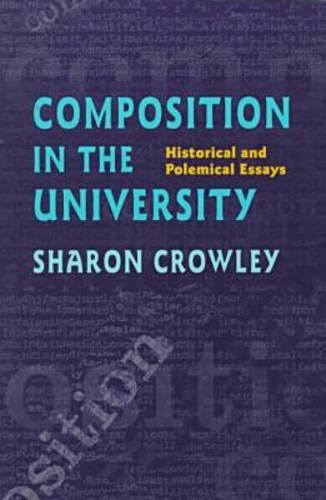Full Product Details
Author: Sharon Crowley
Publisher: University of Pittsburgh Press
Imprint: University of Pittsburgh Press
Dimensions:
Width: 15.00cm
, Height: 2.00cm
, Length: 23.00cm
Weight: 0.481kg
ISBN: 9780822956600
ISBN 10: 0822956608
Pages: 240
Publication Date: 28 May 1998
Audience:
College/higher education
,
Professional and scholarly
,
Postgraduate, Research & Scholarly
,
Professional & Vocational
Format: Paperback
Publisher's Status: Active
Availability: Out of stock

The supplier is temporarily out of stock of this item. It will be ordered for you on backorder and shipped when it becomes available.
Reviews
A must read, not only for everyone working in rhetoric and composition but for anyone interested in the future of U.S. higher education. This remarkable book challenges unexamined assumptions both inside and outside the field of composition studies and suggests provocative solutions to institutional problems plaguing the academic humanities. It will surely be controversial; but whether readers agree or disagree with Crowley, they will certainly learn from her detailed historical analyses and wide-ranging political critiques.-- ""Steven Mailloux, University of California-Irvine"" Each of these essays on composition history and pedagogy in universities is a rich source of new research on actual practices in teaching literature and composition and the cultural and intellectual contexts in which their institutional cooperation has developed. But taken together, these essays also expose the devotion in composition studies to developing students' hermeneutic consciousness, not their rhetorical acumen. Crowley's astute analysis invites all in departments of English to critique--and in the coming century finally to forego--the illogic that requires writing courses that are neither teaching the production of contemporary texts nor aiming to do so.-- ""Susan Miller, University of Utah"" Interesting and compelling.-- ""Kathryn Flannery, University of Indiana"" With her 'modest proposal, ' Crowley calls for a radical redefinition of college English. With the lifting of the first-year composition requirement, teachers will no longer be forced by supply and demand to labor under exploitative conditions. . . . Freed from the conception of composition as remedial gatekeeping, writing instruction can be destandardized, unleashing the disciplinary and professional knowledge of those who profess it. . . . Our responses to Crowley's . . . proposal will inevitably be shaped by our places in the profession. . . . Whatever your own position [Composition in the University] will teach you something useful, and perhaps discomforting.-- ""Rhetoric Review""
"A must read, not only for everyone working in rhetoric and composition but for anyone interested in the future of U.S. higher education. This remarkable book challenges unexamined assumptions both inside and outside the field of composition studies and suggests provocative solutions to institutional problems plaguing the academic humanities. It will surely be controversial; but whether readers agree or disagree with Crowley, they will certainly learn from her detailed historical analyses and wide-ranging political critiques.-- ""Steven Mailloux, University of California-Irvine"" Each of these essays on composition history and pedagogy in universities is a rich source of new research on actual practices in teaching literature and composition and the cultural and intellectual contexts in which their institutional cooperation has developed. But taken together, these essays also expose the devotion in composition studies to developing students' hermeneutic consciousness, not their rhetorical acumen. Crowley's astute analysis invites all in departments of English to critique--and in the coming century finally to forego--the illogic that requires writing courses that are neither teaching the production of contemporary texts nor aiming to do so.-- ""Susan Miller, University of Utah"" Interesting and compelling.-- ""Kathryn Flannery, University of Indiana"" With her 'modest proposal, ' Crowley calls for a radical redefinition of college English. With the lifting of the first-year composition requirement, teachers will no longer be forced by supply and demand to labor under exploitative conditions. . . . Freed from the conception of composition as remedial gatekeeping, writing instruction can be destandardized, unleashing the disciplinary and professional knowledge of those who profess it. . . . Our responses to Crowley's . . . proposal will inevitably be shaped by our places in the profession. . . . Whatever your own position [Composition in the University] will teach you something useful, and perhaps discomforting.-- ""Rhetoric Review"""
Author Information
Sharon Crowley is professor of English at Arizona State University. She is the author of Composition in the University, The Methodical Memory, and the textbook Ancient Rhetorics for Contemporary Students.




